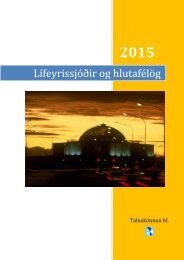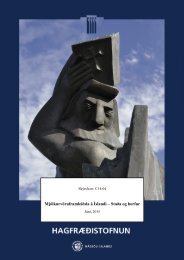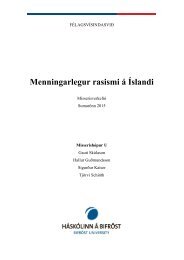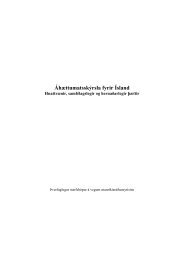You also want an ePaper? Increase the reach of your titles
YUMPU automatically turns print PDFs into web optimized ePapers that Google loves.
WORLD REPORT 2016<br />
HUMAN RIGHTS WATCH<br />
Ecuador<br />
The administration of President Rafael Correa has expanded state control over<br />
media and civil society and abused its power to harass, intimidate, and punish<br />
critics. In 2015, thousands of people participated in public demonstrations<br />
against government policies. Security forces on multiple occasions responded<br />
with excessive force. Abuses against protesters, including arbitrary arrests, have<br />
not been adequately investigated.<br />
Other ongoing concerns include limited judicial independence, poor prison conditions,<br />
and women’s and girls’ limited access to reproductive health care due to<br />
fear of prosecution.<br />
Conduct of Security Forces<br />
Ecuadorian security forces repeatedly used force against peaceful protesters in<br />
2015. In August, a minority of participants in largely peaceful nationwide demonstrations<br />
attacked security forces with rocks, sticks, spears, and Molotov cocktails,<br />
leaving 116 officers injured. Security forces responded with at times<br />
unnecessary and unlawful force, beating or arbitrarily arresting dozens of<br />
demonstrators and bystanders, and illegally entering the homes of people who<br />
were not participating in the protests.<br />
French-Brazilian journalist and academic Manuela Picq, for example, was<br />
demonstrating peacefully in Quito when police officers kicked and beat her. Picq<br />
was detained and left the country after her visa was arbitrarily revoked. Manuel<br />
Asunción Poma Poma, a resident of Saraguro, Loja Province, said he was leaving<br />
a store close to where a demonstration was taking place when security forces attacked<br />
him with batons, knocking out five teeth and damaging his jaw.<br />
Authorities charged 130 people for their alleged responsibility in violent incidents<br />
but appear to have made no serious effort to investigate officials who<br />
used brutal force to disperse anti-government protests, according to information<br />
provided by the Attorney General’s Office in October. President Correa congratulated<br />
security forces for their performance.<br />
In recent years, prosecutors and judges in Ecuador have charged anti-government<br />
protesters with “terrorism” and “sabotage.” A new criminal code that en-<br />
tered into force in August 2014 narrowed the previously vague and overly broad<br />
definitions of both offenses, but judges failed to act promptly to use the new<br />
provisions to review unjust convictions in cases where high-level government officials<br />
signaled satisfaction with the convictions.<br />
In October, the National Court of Justice sentenced five protesters to 18 months<br />
in prison for paralyzing public services, accusing them of forcibly entering the offices<br />
of Ecuador TV, the public television channel, during a police mutiny in September<br />
2010. The protesters were demanding an opportunity to speak to the<br />
public after the government had ordered all stations to transmit Ecuador TV’s<br />
programming. Among those convicted was a student who did not enter the<br />
building but was accused of supporting the group’s actions with his applause.<br />
Freedom of Expression<br />
A 2013 communications law gives the government broad powers to limit free<br />
speech. The law requires all information disseminated by media to be “verified”<br />
and “precise,” opening the door to censorship by allowing the government to<br />
decide what information meets these vague criteria. It also prohibits “media<br />
lynching,” defined as “repeatedly disseminating information with the purpose of<br />
discrediting or harming the reputation of a person or entity.” In addition, it prohibits<br />
what it terms “censorship,” which, under the law’s definition, includes the<br />
failure of private media outlets to cover issues that the government considers to<br />
be of “public interest.”<br />
The Superintendency of Information and Communication (SUPERCOM), a government<br />
regulatory body created by the 2013 Communications Law and separate<br />
from the Communications Ministry, has in dozens of cases ordered media outlets<br />
and journalists to “correct” or retract reports, or publicly apologize for their<br />
contents, including in opinion pieces and cartoons. SUPERCOM has also accused<br />
outlets of engaging in “censorship” by not publishing information officials<br />
deemed important.<br />
The Correa administration repeatedly used the communications law to order<br />
media outlets to publish information favorable to the government. In July, the<br />
newspaper El Mercurio reproduced an article by the Spanish news agency EFE on<br />
the Pope’s visit to Ecuador with the heading: “Extraordinary Welcome in Quito to<br />
Pope Francis and Loud Whistling against Correa.” The communications minister<br />
218<br />
219










